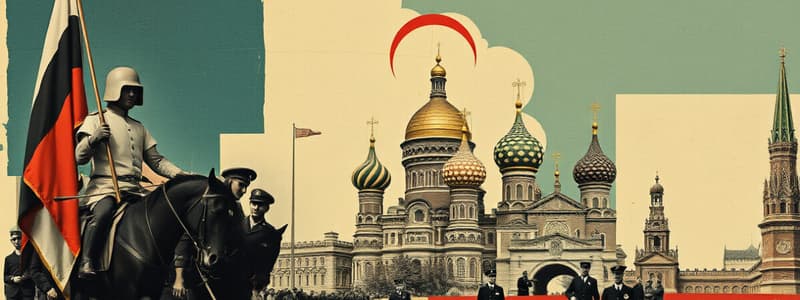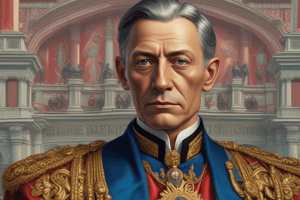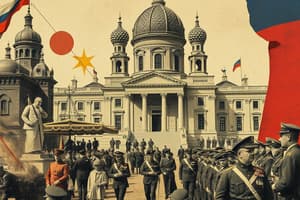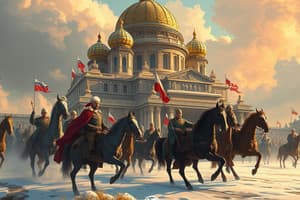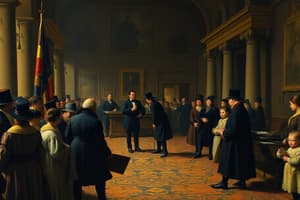Podcast
Questions and Answers
What was one of the key economic policies instituted by the Provisional Government?
What was one of the key economic policies instituted by the Provisional Government?
Which freedom was NOT granted to the Russian people during the time of the Provisional Government?
Which freedom was NOT granted to the Russian people during the time of the Provisional Government?
What replaced the police units during the Provisional Government period?
What replaced the police units during the Provisional Government period?
What was the significance of the introduction of the eight-hour workday?
What was the significance of the introduction of the eight-hour workday?
Signup and view all the answers
Which of the following did the Provisional Government NOT facilitate?
Which of the following did the Provisional Government NOT facilitate?
Signup and view all the answers
How did the Provisional Government's reforms affect the political landscape in Russia?
How did the Provisional Government's reforms affect the political landscape in Russia?
Signup and view all the answers
What obligation did the Provisional Government place on the military units that joined the revolution?
What obligation did the Provisional Government place on the military units that joined the revolution?
Signup and view all the answers
What was one of the social changes implemented by the Provisional Government?
What was one of the social changes implemented by the Provisional Government?
Signup and view all the answers
What was a significant focus of the Provisional Government during its time in power?
What was a significant focus of the Provisional Government during its time in power?
Signup and view all the answers
What led to overcrowding and poor living conditions during the late Tsarist period?
What led to overcrowding and poor living conditions during the late Tsarist period?
Signup and view all the answers
How did the Provisional Government's policies affect workers' rights?
How did the Provisional Government's policies affect workers' rights?
Signup and view all the answers
What was the primary rallying cry for the Bolsheviks during the Provisional Government's rule?
What was the primary rallying cry for the Bolsheviks during the Provisional Government's rule?
Signup and view all the answers
What major issue persisted in the countryside despite the overthrow of the Tsar?
What major issue persisted in the countryside despite the overthrow of the Tsar?
Signup and view all the answers
What issue was reported to be non-existent in the living conditions of workers in Petrograd?
What issue was reported to be non-existent in the living conditions of workers in Petrograd?
Signup and view all the answers
What form of worker representation was allowed under the Provisional Government?
What form of worker representation was allowed under the Provisional Government?
Signup and view all the answers
Which of the following was a characteristic of the living conditions of peasants?
Which of the following was a characteristic of the living conditions of peasants?
Signup and view all the answers
What was a consequence of the Provisional Government's focus on broader issues over immediate needs?
What was a consequence of the Provisional Government's focus on broader issues over immediate needs?
Signup and view all the answers
Study Notes
Provisional Government and Russian People's Conditions
- The Provisional Government took power amid significant economic and social issues facing the Russian population.
- Short-term problems, particularly stemming from World War I, compounded long-standing issues that previous rulers had neglected.
Freedoms Granted
- The period marked the greatest expansion of freedoms for Russians, encompassing various reforms:
- Political prisoners, including terrorists, received immediate amnesty.
- Freedom of speech and assembly was established, along with the right to strike.
- Aimed for the abolition of religious, national, or social privileges.
- Preparations began for a Constituent Assembly with universal suffrage.
- Removal of provincial governors, replaced by locally elected militia and officials.
- Trade unions received recognition, leading to an eight-hour workday.
- The introduction of jury trials; capital punishment and exile were abolished.
- Censorship was eliminated; economic policy shifted towards printing more money.
Domestic Policies and Government Interaction
- The government aimed to collaborate with the Petrograd Soviet, signaling a proto-democratic shift in governance.
- Citizens experienced unprecedented rights, including freedom from censorship, control, and police oppression.
Living Conditions
- Despite newfound freedoms, actual living conditions for workers and peasants remained dire.
- Industrialization in Russia led to overcrowding and poor housing situations, especially in cities like St. Petersburg.
- Lack of proper water and waste management resulted in widespread disease, contributing to high mortality rates.
- Workers expected improvements, but the war and political priorities hindered significant changes during the Provisional Government’s rule.
- The lack of basic changes became a rallying point for Bolsheviks, who promoted slogans like “Peace, Bread and Land.”
Rural Living for Peasants
- Peasant conditions largely stayed the same, with little change from Tsarist policies.
- Peasants lived in small wooden huts, and the redistribution of land from nobles provided minimal improvement.
- The Provisional Government made little effort to address peasant hardships, reflecting ongoing neglect that persisted during the Communist era.
Work Conditions
- Work for peasants remained stagnant, with many either farming or migrating to cities to escape harsh wartime conditions.
- Workers enjoyed some benefits like the eight-hour workday and enhanced influence through trade unions and committees; however, the overall work environment remained tough.
- Economic conditions did not significantly evolve under the Provisional Government, paralleling the stagnation experienced during Nicholas II's reign.
Summary of Changes
- Despite the introduction of political freedoms, the everyday lives of Russians largely reflected continuity rather than transformation; significant social and economic issues remained unaddressed.
- Problems such as poor living conditions, insufficient work opportunities, and the ongoing war persisted even as the Provisional Government attempted to foster a more democratic state.
Studying That Suits You
Use AI to generate personalized quizzes and flashcards to suit your learning preferences.
Description
This quiz explores the significant social and economic challenges faced by the Russian people during the era of the Provisional Government in 1917. It examines both long-standing issues and the immediate effects of World War I on society. Test your understanding of this pivotal moment in Russian history.
